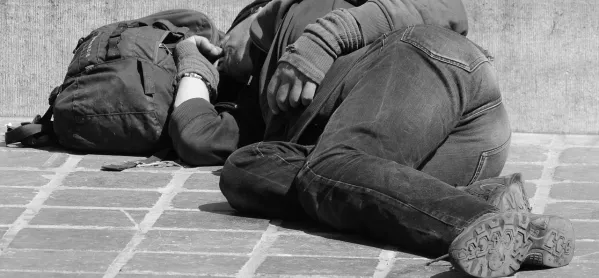- Home
- ‘Keeping young homeless people in education should be a top priority’
‘Keeping young homeless people in education should be a top priority’

When I first became a teacher in 2004, I was motivated by a desire to tackle educational disadvantage.
As I entered the classroom, I was shocked by the extent to which children from less advantaged backgrounds struggled to succeed in education. It drove me to want to be part of the solution. Now, as a teacher who is also a researcher, I have been shocked once again.
This time by the unfairness faced by perhaps the most vulnerable young people in our society - those experiencing youth homelessness. A group that is estimated to number over a quarter of a million young people a year.
Researching A Place to Call Home, a new report published today by the Sage Foundation and written by myself and colleagues at thinktank LKMco, showed me that many risk factors for youth homelessness kick in well before young people reach crisis point. Yet too often they are unable to access the support they need.
As I worked with and interviewed homeless 16-24-year-olds, I was constantly wondering how these individuals could have been helped earlier and, whilst it is clear that schools cannot do everything, I am now much clearer about some of the things they could do.
Research by Homeless Link suggests that the most common reason why young people seek housing support is that their main care givers are no longer willing or able to provide a home. Whilst this may not be surprising to some, our research dug a layer deeper and found that this was driven by a range of factors. Schools are particularly well placed to spot and respond to two of these: bereavement and relationship breakdown.
Between 3 per cent and 5 per cent of young people experience the loss of a parent or sibling before they are 16 , and roughly half of the young people we worked with explained that the death of a close friend or family member had negatively impacted on their education and relationships with parents or carers. Emily, a homeless young person in Newcastle, was one such young person.
“When I was in Year 9 I ended up getting kicked out of school … because I lost a little cousin, he died… and I started going downhill. I used to be good in school until I lost my little cousin and then I just didn’t want to be in a classroom with loads of people any more and do what the teachers said to do… I felt angry, upset, heartbroken.”
According to Age UK, approximately 300,000 children in the UK are looked after by “friend and family care givers”, often grandparents. The consequences of bereavement can be particularly stark for these young people. This was very much the case for Jerome, a young person in London, who said his “world just fell apart” when his grandparents passed away. Unfortunately, following their death, Jerome’s deteriorating mental health and his inability to support himself financially in their home meant he eventually became homeless.
The impact of bereavement
Given the impact of bereavement on education, and the fact that schools and colleges are often the first institutions to find out, they are at the frontline in brokering an early response.
As Jerome went on to explain: ”My grandmother died, I lost my job and then I was made homeless. There was no one in college to even go and speak to… How am I meant to attend when I live miles away and have to pay about £5 every day to get here?”
A rapid response from schools, for example, helping young people to access bereavement counselling or helping them out with practical problems could not only ensure that young people’s educational achievement is not hampered, but also stop the slippery slope to homelessness.
Similarly, where family relationships are beginning to break down, schools can often spot this early. Very often, relationships can be rebuilt or at least made liveable, using approaches such as family mediation. Schools should, therefore, ensure that staff with key pastoral and safeguarding responsibilities know how to recognise the warning signs and signpost to appropriate support.
After several months working with these incredible, funny and hopeful young people and finding out about their lives, I find myself considering my own classroom and the young people I have taught. I think about those who suddenly had to live with grandparents, or older siblings in different cities. For me, it is clear that ending youth homelessness is all of our responsibility as part of a humane society. I cannot and should not sidestep this responsibility as a teacher.
Many of the factors that contribute to homelessness make it hard for young people to succeed or even remain in education but keeping homeless young people in education and supporting them to achieve well is one of the most important forms of support that educational institutions can provide.
Iesha Small is an experienced teacher and leader as well as a senior associate at the education and youth ‘think and action-tank’ LKMco
Want to keep up with the latest education news and opinion? Follow Tes on Twitter and like Tes on Facebook
Keep reading for just £1 per month
You've reached your limit of free articles this month. Subscribe for £1 per month for three months and get:
- Unlimited access to all Tes magazine content
- Exclusive subscriber-only stories
- Award-winning email newsletters

